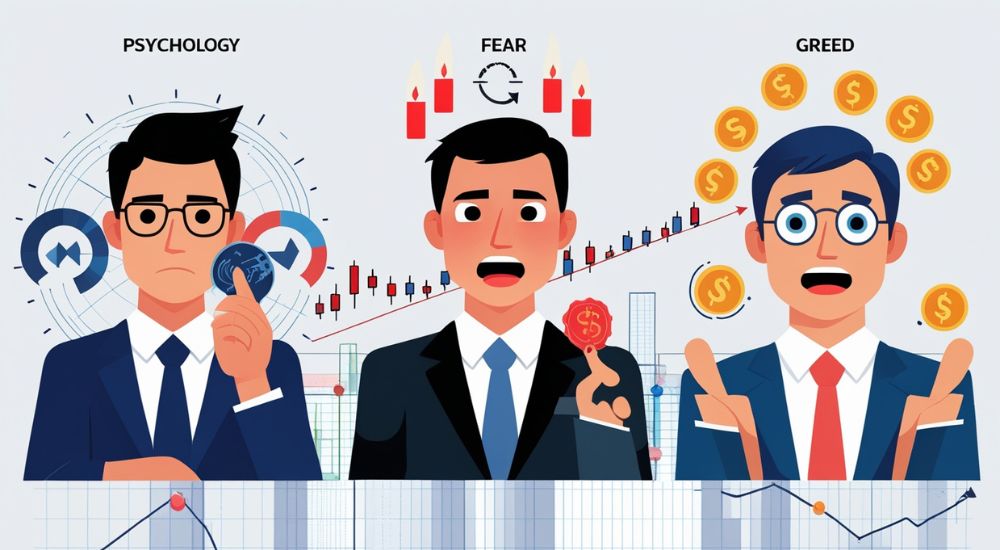Why do investors frequently sell low and buy high? Why does a market dip feel like danger while a rally feels like an invitation? The human mind holds the solution. Welcome to the exciting field of stock market psychology, where daily trades worth billions of dollars are influenced by feelings like greed and fear.
This blog post examines how psychological aspects influence financial choices and how being aware of them can help you become a more astute and resilient investor. This guide will give you the mentality you need to confidently navigate volatility and unlock profits, regardless of how experienced you are.
Table of Contents
What Is Stock Market Psychology?
The collective attitude and emotional condition of investors that affects market behavior is referred to as stock market psychology. Emotions frequently triumph over reason, even though technical and fundamental analysis are important.
Markets are driven more by emotion than by reason.
Benjamin Graham
Important Influences:
- The Herd Mentality
- Overconfidence Bias
- Aversion to Loss
- Confirmation Bias
The first step to avoiding expensive errors is to comprehend these psychological patterns.
🤯 The Role of Fear in Investing
Fear can impede judgment, causing investors to avoid opportunities or sell in a panic. Among the examples are:
- Massive sell-offs occurred during the March 2020 COVID crash, despite a long-term recovery.
- Unexpected declines: Out of fear, investors sell off even robust stocks.
Fear-based behaviors include:
- Panic selling
- Risk aversion
- Holding cash excessively
Learn how to spot fear-driven decisions and shift toward a calm, strategic approach.
🤑 Greed: The Double-Edged Sword
Investors are driven by greed to disregard risk and pursue large returns. Greed was the driving force behind well-known bubbles like the Dot-com boom and the cryptocurrency hype.
Greedy behaviors:
- FOMO (Fear of Missing Out)
- Ignoring valuations
- Overtrading for quick gains
True wealth is created through disciplined, long-term investing, which results from controlling greed.

🌀 The Psychology Behind Market Cycles
Cycles of boom, bust, recovery, and growth characterize market movement. These stages reflect feelings:
- Optimism → Euphoria: Buying frenzy
- Anxiety → Panic: Mass selling
- Capitulation → Hope: Re-entry
Investors can avoid buying at the top and selling at the bottom by being aware of this emotional timeline.
Read how long-term investing helps ride these cycles
😔 Common Emotional Mistakes Investors Make
Both novice and seasoned investors frequently make emotional mistakes. Among the most common errors are:
- Chasing hot stocks
- Selling winners too early
- Holding losers too long
- Checking portfolios obsessively
Awareness of these patterns leads to better habits.
🥇 How to Master Your Emotions While Investing
Practical ways to stay rational:
- Create and follow an investment plan
- Use stop-loss and target strategies
- Keep a trading journal to reflect on decisions
- Diversify to reduce anxiety
Want to know the foundation of investing? Read our beginner’s guide to the stock market.

🔬 Behavioral Finance: Science Meets Strategy
The study of behavioral finance examines how investor decisions are influenced by psychological factors. Important theories consist of:
- Prospect Theory: People fear losses more than they value gains.
- Mental Accounting: Treating money differently based on its source.
- Anchoring Bias: Relying too much on initial information.
These insights give you data-driven ways to make better choices.
🌟 Real-Life Examples of Psychological Traps
- GameStop 2021: Herd behavior and FOMO led to a wild ride.
- Bitcoin Boom: Greed caused irrational spikes.
- March 2020: Many sold near the bottom due to panic.
These examples remind us that markets are emotional machines.
📊 Actionable Tips to Develop a Winning Mindset
- Focus on long-term goals, not daily swings
- Learn to tune out noise (media, social hype)
- Practice mindful investing
- Always ask: “Am I reacting emotionally or rationally?”
You may also find our post on stock market fundamentals helpful.
📅 Conclusion
The stock market is more psychology than numbers. Understanding fear and greed—and how they play out in real time—can help you invest with clarity and confidence. Master your mind, and you’ll master your money.
⚠️ Disclaimer
This article is for educational purposes only and not financial advice. Always do your own research or consult a financial advisor before making investment decisions.
🤔 Frequently Asked Questions (FAQs)
1. What is stock market psychology?
It means how investors’ feelings, like fear and greed, affect their choices and the market.
2. How does fear affect the stock market?
Fear can make people sell their stocks in a panic and miss out on good chances, especially when the market is going down.
3. Can understanding psychology improve investing?
Yes, for sure. Being aware of your emotional biases can help you stay calm and make better decisions.
4. What are some common emotional mistakes?
Common mistakes are following trends, selling in a panic, and ignoring the basics.
5. Is behavioral finance the same as stock market psychology?
Not quite. Behavioral finance is the study of how psychology affects investing in a more academic way, while stock market psychology is more practical and based on experience.

